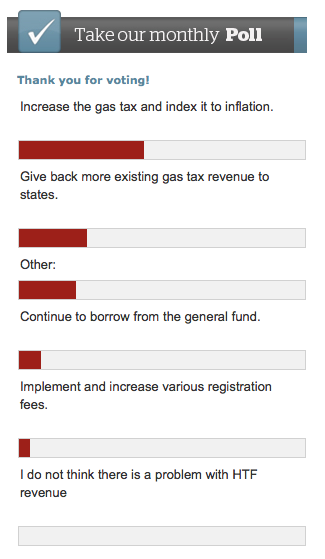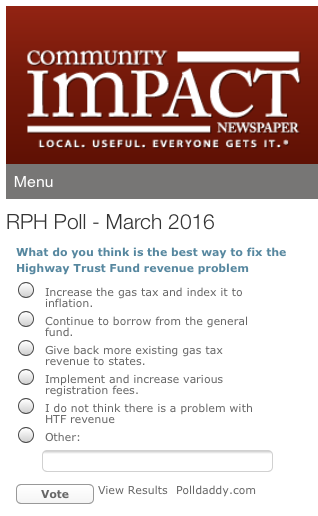Othering reduced spending
Our local Community Impact recently ran a feature article about the Federal government’s Highway Trust Fund and the loss of revenue due mainly to people not driving as much during the great recession.
On their editorial page, they included a poll:
“What do you think is the best way to fix the Highway Trust Fund revenue problem?”
These are the pre-listed choices on top of “Other”:
- Increase the gas tax and index it to inflation.
- Continue to borrow from the general fund.
- Give back more existing gas tax revenue to states.
- Implement and increase various registration fees.
- I do not think there is a problem with HTF revenue
I’m guessing that, as close to Austin as we are, the Impact doesn’t endorse less spending but… even given that bias is “reduce spending to match revenue” really a worse answer than the punctuation-challenged “I do not think there is a problem with HTF revenue”?1
I don’t think it should come as a surprise that “Other” is currently third, and nearly tied with the second-highest choice, “Give back more existing gas tax revenue to states.”

I take some solace in that “Other” is not normally a high vote-getter.
The federal fuel tax is already 18.3 cents per gallon. That’s a 9.7% tax going by what I last paid for gas (yes, I’m one of those who doesn’t fill up their tank as often as the government would like) and about 8% against current prices. Those are high rates of sales tax,2 but the preferred option in Washington and Austin is to increase that percentage.
I’m almost tempted to support the option to index the gas tax to inflation, just to see how the government both denies that inflation is happening and uses inflation to increase the tax.
Wikipedia has a similarly odd statement, “As of 2015, despite a sharp drop in gas prices, strong resistance remained by both the American public and Congress to raising the gas tax.”
The American public knows that most of the time, when the price of something drops, the taxes on it drop as well. The fiscally-sound solution to fluctuating revenue is to spend less than the average and build up a savings account to cover times of lower revenue.
If they really want to index the gas tax to inflation, set it to, say, 5%, rather than a fixed amount. What they want is for the tax to go up when prices go up, but not go down when prices drop again. They want to index revenue, but not index spending.
In response to 2015 in photos: For photos and perhaps other quick notes sent from my mobile device or written on the fly during 2015.
Yes, the final option was missing a period—it’s not a typo on my part.
↑The percentage when the tax was enacted under Clinton in 1993 was over 16% (against gas fluctuating with a high of around $1.10).
↑
- Congress battles Highway Trust Fund deficit: Matt Stephens and Amy Denney at Community Impact
- “The majority of HTF revenue is generated by 18.4 cents taxed for every gallon of gas pumped throughout the country as well as 24.4 cents per gallon of diesel gas. The gasoline tax has not increased since 1993, said Janet Kavinoky, executive director of transportation and infrastructure for the U.S. Chamber of Commerce.”
- Highway Trust Fund at Wikipedia
- “The United States Highway Trust Fund is a transportation fund which receives money from a federal fuel tax of 18.3 cents per gallon on gasoline and 24.4 cents per gallon of diesel fuel and related excise taxes.”
More government spending
- The Family Cow
- If you kill the cow for steak today, you won’t have any milk tomorrow. We are digging deep into our national cash cows—taxpayers—and we’re going to soon run out.
- Why “we don’t have a plan” is selfishly incompetent
- The Obama White House tells congress, “we don’t have a plan, but we don’t like your plan” when confronted with the destruction of the United States economy by 2027. Why can’t we continue to live large and then fix the problem in 2027?
- Ryan: End oil subsidies?
- Of course we want to end oil subsidies. Maintaining oil subsidies because gas prices might rise is crazy: we pay for those subsidies, too!

